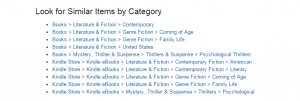Digital
Whether you know what BookBub is or you don’t, whether you have a book for sale now or are still working on a draft, whether you’re independently or traditionally published, you’re going to want to read this Q&A. First, for anyone who doesn’t know what BookBub is about, BookBub is a company that promotes quality e-books with temporarily–and drastically–slashed prices, via a daily newsletter and web updates. They are good at what they do. Very, very good. In a world where we as authors can’t be sure what will or what will not sell books, this seems one sure thing: A BookBub promotion means sales and lots of them.
How to use BookBub is something that stymies many authors I know, though, so when I noticed BookBub’s star presence at this year’s Book Expo America, I approached. That’s when I met Diana Urban, BookBub’s Industry Marketing Manager. I told her my publisher, Random House, had run a BookBub for my second novel, The Moon Sisters, which went exceptionally well. (As I revealed in an essay for BookCountry, sales for the eBook of The Moon Sisters had never really taken off. But the day after my BookBub, the eBook of The Moon Sisters was ranked #10 in Nook books at Barnes and Noble, and #1 in the Mothers and Children fiction category on Amazon.) We chatted for a bit, and then I asked if she’d be interested in doing an interview with me for Writer Unboxed. Happily, she agreed.
[pullquote]Bio Box: Who is Diana Urban? Diana is the Industry Marketing Manager at BookBub, where she regularly publishes content on book marketing, self-publishing tips, and publishing insights at the BookBub Partners Blog. She was previously the Head of Conversion Marketing at HubSpot and is an expert in inbound marketing, content marketing, and lead generation. Diana is also the author of two Young Adult thrillers, and is writing her third novel. Follow her on Twitter at @DianaUrban.[/pullquote]
I recently asked the Writer Unboxed community–mostly through our Facebook group–to chime in with any questions they had about BookBub, and many of those questions are reflected here. So let’s get to it–part 1 of a two-part interview.
The Writer Unboxed / BookBub Interview, Pt 1
TW – Q1: It’s the prevailing opinion that BookBub is unique among a pool of book-promotion services, in that it seems to move the needle in a much more significant way and have a lasting sales impact on the books that are promoted. Why do you think that’s the case?
BB: One of our core goals has always been to provide authors and publishers with a way to run book marketing campaigns that drive real, measurable results. We’re a data-driven company, so every decision we make — from the categories we launch to the new members we acquire — is based on the results of rigorous testing and analysis, which helps us ensure that BookBub continues to be effective at moving the needle for our partners.
BookBub is also unique in that we’re providing curated recommendations to millions of loyal power readers who have specifically opted into genres they’re interested in reading. Our partners […]
Read MoreLike A Wolf, They’re Tracking You, Virginia
On the way to the digital disruption of the industry! the industry! we online news people (remember news people?) realized that advertisers were asking for — and getting — more and more data based on how our readers were using our work.
In the Ante-Digital Era: At a newspaper, the staff (in hoop skirts) would place your ad and assure you that our circulation rate on a Thursday was 600,000 or more. But could we tell you how many of those 600,000 fine recipients of our newspaper actually saw your ad? Of course not. We didn’t even know how many people had opened the paper at all that day. Dogs were seen running away with at least four copies and were not expected to be highly reactive to advertising therein.
In the Post-Digital Era: At a news site, the staff (in body art) would watch the clicks. At least one luminously GUI-ed software provided heat-mapping on selected pages so that a newsroom could see where on that page the most cursor clicks were occurring. A headline with the word “sex” in it always glowed much pinker than breaking news about the Security Council.
[pullquote]There is one trend that is striking more fears in publishers’ minds than any other. And that is the fear of data. — Andrew Rhomberg[/pullquote]
This was reader data, pouring in. And a heartbeat later it became reader analytics as someone parsed it.
To be sure, coded ads had been in play for quite awhile, both in print and on radio and TV — call a given phone number or provide a certain code from the ad and the advertiser could tell that you were watching or reading this or that. But those old-media “call-response” ads were nothing compared to what could be done in the online environment, where user movements could be monitored in real time. Advertisers might find out that no one had clicked on their expensive brand message. We were all over it like a cheap suit.
And does that reality today ever, in some news setting somewhere at some time, affect choices about what news is reported, where and how it’s reported, when it’s reported, maybe with “sex” in its headline?
You didn’t come here to talk about the news industry. How silly of me. Step this way, please.
Publishers And The Fear Of Data
There is one trend that is striking more fears in publishers’ minds than any other. And that is the fear of data.
For me, the fear of Andrew Rhomberg’s London-based company name — Jellybooks — is a lot worse than the data scare. The very thought of jellied books, it’s like something out of Roger Corman, isn’t it? But poor Andrew has listened to me carp about his start-up’s name so long that I think he counts it as useful PR. As long as I spell Jellybooks correctly, right?
And he’s onto something in his latest aria at Digital Book World, The Fear of Data. Kind of grabs you like The Edge of […]
Read MoreCalling Them Out
IRL, in real life, if you were mad at someone for something, would you walk into the village square, face the buildings, and start yelling that person’s name and your complaints about them? You’d be calling them out, physically, demanding that they change their ways and accusing them of wrongdoing in front of passersby and traffic. Sound like a plan to you?
We’re going to come back to that nightmarish scenario. It has the feel of something from The Twilight Zone, doesn’t it? Hold onto that.
Today, as my Provocation in Publishing for you, I want to ask you to consider just that: our provocations in publishing, and the shared space in which we conduct them online, a pretty glassy house.
How do we disagree with each other? And why do we provoke each other in the ways we do?
In recent weeks, this topic has been gaining attention. The level of concern is rising. Three examples.
(1) Howling at Howey. As Amazon’s Kindle Direct Publishing (KDP) Select put its new per-page payout scheme into place early this month, the author Hugh Howey completed a full year of weighing whether to participate fully and to accept the exclusivity required. While he originally was given a limited-time special arrangement to try Kindle Unlimited (KU) without the exclusivity requirement a year ago, he has made it clear that he enjoys no such exemption now. And Amazon’s change to the per-page payout structure — he calls this “KU 2.0” — has persuaded him to go in:
All of my novels and stories are now in Kindle Unlimited (KU).
[pullquote]When did ‘winning’ every argument become the goal? Why do so many seem to feel they need to (a) ‘succeed’ by changing minds and (b) put down all dissent?[/pullquote]
I wrote about this at The Bookseller’s The FutureBook, which I manage as its associate editor. (Our weekly live #FutureChat on Twitter is today at 11 a.m. New York / 4 p.m. London time, you’re always welcome to join us if you like.) And I noted then that Howey was taking some powerful flak from followers, some of them castigating him as a turncoat for making a decision they didn’t like. He suggested at one point that the new plan would base payments on reader satisfaction. “If your income goes down, someone more deserving is seeing their income go up.” As it turns out, one of his readers had no interest in hearing this:
Did you really just say that? I used to have respect for you… that’s gone now. How dare you say that authors who have been busting their balls to make a living at this career that they are not deserving! I write romance, have been making a decent income since 2014, not spectacular by any means but my readers love what I write and yet because my income is set to go down in KU 2.0 I am not worth shit?
“The quickest way to get a thread blocked at KBoards these days,” Howey wrote to fellow author Alan Tucker, “seems to be to mention me, have me […]
Read MoreRecently I was approached by the people from Masterclass, a brand new online learning hub which features courses in different areas of the arts and sport, taught by world-famous masters of their craft–such as Dustin Hoffman for acting, Serena Williams for tennis–and James Patterson for writing. Masterclass asked if, as an experienced author, I’d be interested in checking out the course and seeing what I thought. I did some research, discovering Masterclass to be a start-up based in San Francisco that had debuted in May this year and that it was themed around the concept that some masters in their field are also great teachers, and love to impart the knowledge and experience they’ve gained. I liked the idea and was also, I admit, curious to hear what the world’s highest-selling author had to say about his ways of working, so using the gift code provided, (the whole course costs $90 US normally, which seems very reasonable considering what you get) I set up my account, logged in and began exploring.
First of all, I want to write about how the course is structured, and then move to a discussion of whether it works, and for whom. There are four parts to the course: firstly a series of 22 videos in which James Patterson talks about different aspects of the craft of creating fiction: raw ideas; plot; creating characters; successful outlines; research; writing dialogue; building chapters, how to write good endings, editing, and much more, through to post-creation issues such as titles, marketing–and of course getting published! There are also a few more personal themed-videos: one where the author recounts his own personal journey to publication and success; one where he rather amusingly recounts his brushes with Hollywood; and one on the experience of working with co-authors. The videos vary in length between 3 and 14 minutes, depending on the complexity of the theme, and all of them feature James Patterson talking directly to the camera, in a chatty, conversational style, truffled with anecdotes, examples, tips and pithy sayings (a favourite of mine: Passion and habit are key to a successful writing career). Secondly, there is a 72 page downloadable and printable workbook which is designed to complement and expand the videos, recapping on each theme, and providing practical exercises for students to complete on their own. The workbooks come in two versions: one which includes the very comprehensive outline Patterson wrote for his novel Honeymoon (which can be used in assignments) and one without the Honeymoon outline. Thirdly, there is a section called ‘Office Hours’ where the author answers questions video-recorded or written in by students (of course these are selected as otherwise it would be all too easy to become overwhelmed). Within this section also is a series of video critiques by Patterson looking at selected class assignments and how students have handled them–for example, he looks at a whole lot of potential book titles that have been sent in, and says whether he thinks they work, and why they do or don’t. Finally, there is a discussion facility on each theme, where students can interact with each other based initially on a moderator’s discussion question (he’s called a […]
Read Morea snapshot of categories on Amazon; can be seen at the bottom of any e-book page
Our guest today is Penny C. Sansevieri, Founder and CEO Author Marketing Experts, Inc. Penny is a best-selling author and internationally recognized book marketing and media relations expert. She is an Adjunct Professor teaching Self-Publishing for NYU. Her company is one of the leaders in the publishing industry and has developed some of the most innovative Social Media/Internet book marketing campaigns. She is the author of fourteen books, including How to Sell Your Books by the Truckload on Amazon and Red Hot Internet Publicity, which has been called the “leading guide to everything Internet.”
I think every indie author should empower themselves with Amazon knowledge, and so I’ve made it my mission to help them decipher the site. I teach about Amazon, I write about it, and I’m passionately committed to helping authors succeed!
To learn more about Penny’s books or her promotional services, you can visit her web site at www.amarketingexpert.com. You can also connect with Penny on Facebook, Twitter, and on her blog.
Demystifying Keywords, Categories, and Themes For Amazon Indie Authors
To most indie authors, Amazon is really confusing. There seems to never be a clear path to success and once there is some clarity, the path changes yet again. If you feel like this, take heart. Though Amazon is tricky, it’s not a total mystery.
Let me start by presenting Amazon to you in a different light: Among all of the other things that Amazon does for us as consumers and authors, Amazon is a search engine. When you start looking at Amazon that way, a lot of the information in this article will start to make more sense.
When I view categories for my Kindle book, I see both “Books” and “Kindle Store” categories. Which categories matter most?
That’s a great question, but let’s look at this a bit differently. If you’ve explored the categories in print at all, you’ll likely see that they are vastly different from the eBook categories. That’s because the print categories are based on an industry standard of categorizing and sorting books — a standard used by e-stores and brick-and-mortar stores alike–called BISAC. Kindle store categories, on the other hand, are based on the things Amazon has learned we are looking for — years of data collected by Amazon’s search engine. Both are important, but they may not line up. Additionally, BISAC categories are limited while eBook categories offer greater variety and specificity of category. For that reason, I would stick with eBook categories as your primary focus.
It’s not a bad thing to have different book categories in both “Books” and the “Kindle Store,” by the way. It’s sort of like the old saying: The rising tide floats all boats. If you end up getting a lot of eyes on your book through a Kindle Store category, that can raise the exposure of your books in categories across the board.
PRO TIP: Amazon is really two websites in […]
Read MoreFor many of us, spring marks a new beginning. A period of reinvention. An opportunity to grow. It seems the same can be said of digital publishing. With e-book sales slowing, publishers are experimenting with new retail channels and digital marketing opportunities, while other key players are transforming their business models in hopes of reaching more readers. Here are the latest developments…
Trains, Planes, and…E-books
Publishers are setting their sights on travelers…
Free Kobo E-books Now Available on Southwest Airplanes
Kobo has teamed up with Southwest Airlines to offer free e-books to travelers who want to read digitally…https://bit.ly/1FqoAl8
HarperCollins Takes Flight with JetBlue Ebook Partnership
Back in November, JetBlue rolled out its new in-flight digital content platform, which came equipped with a selection of samples of twenty best-selling ebooks published by HarperCollins…https://bit.ly/1uBmDWV
Amazon Goes Airborne With JetBlue
Amazon is adding one more advantage to the long list of services it already offers its premium customers. So long as they fly with JetBlue, Amazon Prime members will have unlimited access to the airline’s Wi-Fi, allowing them to stream all the Amazon Prime content available to them – for free. This includes thousands of films and TV shows via Amazon Instant Video, more than one million songs, curated playlists and 500,000 eBooks on Kindle’s Owner’s Lending Library… https://bit.ly/1KVnThU
Read Moreby André Freitas
Since 2010, I’ve been actively teaching students of all backgrounds about using digital media for creative endeavors, whether through traditional university courses or through online classes. I also send out a (not quite) monthly newsletter introducing writers to digital media tools.
The following resources have surfaced again and again as the most valuable. If you aren’t yet familiar with them, each is worthy of your consideration.
1. Lynda
This is, hands down, the best place to go to learn any software or digital media skill. It’s an on-demand education platform with more than 3,000+ courses at your fingertips. Their offerings have never let me down, and the curriculum and teaching style is the highest quality I’ve found anywhere. If you need to learn a new online or digital media skill, go to Lynda first. (I swear I don’t get paid for saying that.)
2. 279 Days to Overnight Success
Now more than five years old, I still consider this one of the most valuable blueprints and introductions to what it means to build an online presence and start living the creative life you want, on your own terms. Thank you, Chris Guillebeau. Go download it now.
3. Camtasia
As video becomes more prevalent as both a content delivery tool and marketing tool, know how to stitch together a simple video is immensely valuable. I use Camtasia when I need to create “talking head” style videos, screencast tutorials, or a combination of both. It’s fairly straightforward for a beginner to use, and if you feel intimidated, have I told you about an educational resource called Lynda?
4. Canva
Read More
This will be my last post until Monday, April 13,2015.
No, not me. (You wish.)
No, that’s a colleague, the memoirist Kathy Pooler. She’s a good, cold-weather Catholic, mind you, so Lent means a lot more to her than it does to troppo Protestants like me.
Following a retreat with some author-colleagues, Pooler has decided to cut her exposure to social media way back for Lent. She writes:
Being away with these treasured friends got me in touch with my own need to step back—rest, refresh, renew. After five-plus years of nonstop weekly blogging and intense social media involvement, I have decided to…go on my own Lenten sabbatical.
She’ll have a few guest posts going up, and she’ll check email. But, she writes, “I will limit my time on Facebook and Twitter to automated sharing of guest posts. This will mean turning off my social media notifications on my iPhone.”
So now we can talk about her all we want. Just kidding. Pooler goes on:
I know that limiting my social media presence will be a supreme challenge as I so love connecting with others. But I also know I need to take care of myself; to step back and reflect before I can come back and be all I need and want to be. And it fits in with my mantra to “simplify.” Until we meet again, I wish you all peace and quiet moments of reflection during this Lenten season. I look forward to returning in April refreshed and renewed. I plan to share the lessons learned when I return.
Aside from the fact that Pooler turns out to be really good at benedictions (who knew?), this has reminded me of the February 3 post here from Therese Walsh, author and Writer Unboxed’s co-founder. She wrote about a search for “mono-tasking,” meaning, in essence, the ability to hunker down on one sustained project or task without feeling pulled apart by competing thoughts and stimuli. So many of us know what she’s talking about, all too well.
Walsh and I have been in touch a bit since that post ran, comparing notes. I’ve offered a few technical responses that I find helpful to the relentless blitz — RescueTime (which I find invaluable — you’re welcome to explore it free with my link); “frequency following” sound recordings, which I find helpful while focusing on work; meditation.
I’ve been thinking a lot about what she wrote, her distress at feeling her concentration is challenged — I can relate; that bad feeling (this is my characterization, not hers) of having our livers pecked out by data transmissions.
And I’ve been thinking about what Pooler’s doing, heading off the social grid to get a grip.
In keeping with the Lenten theme, it has to do with temptation, somehow. I think this is part of what we’re talking about.
Read MoreBack in July, I wrote a post about my reluctant journey into the seemingly overwhelming world of audiobook production and the lessons I learned along the way. I shared my advice for choosing a narrator and selecting the right royalty structure, and warned of some production perils to avoid. Many of you responded to that post with questions about how to market an audiobook. As a former corporate marketeer, your interest in this side of things got me excited— probably because my friends’ eyes glaze over when I say words like “metadata” or “demographics”—so I’ve returned today to address the issue.
As an independent author and publisher, I’m constantly faced with the challenge of how to compete in a crowded marketplace with titles that have big budgets and entire publicity teams behind them. Many shy away from the challenge, chalking it up as impossible, but I’ve learned that you can reach readers without spending big money; you just have to be creative.
Here are nine easy and inexpensive ideas you can try right away…
1. Reviews
Just as there are reviewers for print and e-books, there are reviewers who specialize in audiobooks. There are traditional publications, like AudioFile Magazine, which is published in print and digital formats and is dedicated solely to audiobooks, as well as a host of audiobook review blogs that are always looking for new titles. These reviewers can be found with a simple Google search or by perusing directories like the Book Blogger directory, Indie View, or the Book Blogger List.
Don’t forget about your own fan base. If you’ve produced your audiobook with ACX, then you will receive 25 promo codes that you can use to give away free copies of your audiobook in exchange for a review.
>Tip: As stellar reviews come pouring in, re-post them on your social sites to help spread the good word.
2. Interviews
Reach audiobook enthusiasts using other audio formats, like radio and podcasts. There are thousands of radio stations and podcasts that offer a variety of programs, which are often looking for guests and experts. Think about the subjects explored in your audiobook and how they could translate into an interesting discussion or interview. Then, identify a list of shows that would benefit from having you as a guest and pitch yourself to the shows’ producers.
For example, my audiobook, Empty Arms, explores teen pregnancy, forced adoptions, sealed records, and their devastating impact on an entire generation of women, so I’ve been targeting programs that deal with women’s issues.
To find radio shows that might be a good fit for your subject matter, check out the Radio Locator database. It’s a useful tool that allows you to search for radio stations by geography or format and then connects you to each station’s website, where you can learn about upcoming show topics and find the producer’s contact information.
For podcasts, visit the Podcasts section of the iTunes store and try searching for different keywords related to your book. You’ll be surprised at the number of shows you find. (Here’s an interview […]
Read More














